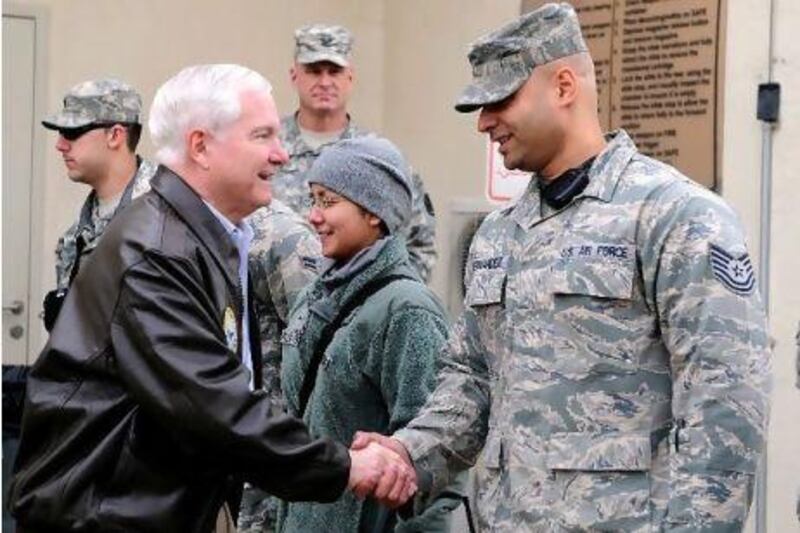KABUL // The US defence secretary told a group of American soldiers at Bagram air field near Kabul yesterday that the American military should remain involved in Afghanistan after the planned end of combat operations in 2014.
"Obviously it would be a small fraction of the presence that we have today, but I think we're willing to do that," Robert Gates said of staying on. "My sense is, they [Afghan officials] are interested in having us do that."
Mr Gates's 13th trip to Afghanistan since he became US defence secretary in 2006, when George W Bush was president, comes at a crucial time for US war strategy in the country.
Foreign troop numbers are the highest they have been in the 10-year conflict because of the US-led military surge.
At the same time, civilian and troop casualties are at their highest levels since the US-led invasion of 2001. Nato will begin its security handover to Afghan forces in July.
A US Defence Department spokesman, Geoff Morrell, told reporters flying with the defence secretary from Washington that Mr Gates, on a two-day visit to Afghanistan, wanted to get a "first-hand feel" for changes on the ground since he was last in the country in December.
In addition to visiting US troops in the country, Mr Gates will meet the Afghan president, Hamid Karzai. The meeting comes after Mr Karzai yesterday rejected a rare apology from the Nato commander, General David Petraeus, for a US air strike that killed nine Afghan children in Kunar last week. According to a statement from his office, Mr Karzai told General Petraeus that civilian casualties caused by US-led forces were "no longer acceptable", and that "apology is not enough".
"Civilian casualties are the main cause of a worsening relationship between Afghanistan and the US," the statement said.
US military commanders in Afghanistan are adamant that the targeting of Taliban strongholds has weakened the insurgency significantly over the past year, disrupting weapons supply lines and insurgent safe havens mainly in the south.
US forces point to security gains made after a major Nato offensive last year in Marjah, a rural farming district in Helmand province once under the sway of the Taliban. The area now boasts a thriving local market and a number of US-supported schools.
Abdul Hayaf, a shopowner in the Marjah bazaar, told The National last month: "We feel good now in Marjah. Things are becoming normal again. Before, there was no security; the bazaar wasn't open," he said. "But now America is helping us more. We hope it will continue."
However, a US military adviser, speaking on the condition of anonymity, said local militias in Marjah are "more or less a disaster from both a security and rule-of-law perspective". Abdul Sultan, a shopkeeper in Marjah's bazaar, said: "The militias, they look exactly like the Taliban. We can't tell the difference. They all have guns."
Taliban insurgents have carried out a number of high-profile co-ordinated attacks against civilian and military targets in major cities across Afghanistan this year, and recent reports of civilian casualties at the hands of Nato forces have prompted angry demonstrations in Kabul.
More than 200 civilians were killed in attacks by insurgent and coalition forces this year, Afghan officials said last month.
During this trip, Mr Gates will also meet with the head of Nato's training mission, Lieutenant-General William Caldwell, who is overseeing $20 billion (Dh73bn) in US funds to train Afghan security forces.
Nato is speeding up its training of Afghan police forces as part of a bid to boost Afghan-led security in key provinces slated for transition this year.
The Afghan army has about 149,000 soldiers and is projected to have 171,600 by October, Nato says. The police force is projected to reach 134,000 by October, up from just more than 115,000 by the end of last year.
In addition to bolstering the ranks of Afghan security forces, US troops are also embarking on a controversial strategy of funding and arming anti-Taliban militias in a bid to bring security to remote districts where Afghan governance is weak.
[ foreign.desk@thenational.ae ]
* With additional reporting by the Associated Press





